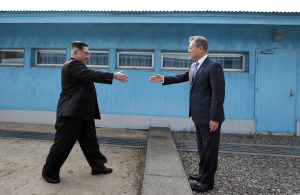Former South Korean President Moon Jae-in has published his memoirs. Despite coming in at a hefty 650 pages, the book has become a bestseller in South Korea. However, South Korean public opinion and media are sharply divided between conservatives and progressives, which means that the book has been either harshly criticized or lavishly praised. Certainly it is a valuable testimony of someone who was able to hold three summit meetings with North Korean President Kim Jong Un, so a more objective examination is warranted.
Moon does reveal some new facts in his book. He says that he exchanged as many as 38 letters with Kim, stating that “at least in the letters, he [Kim] signaled respect for me and a message of concern and encouragement for our people during the pandemic.” Moon also notes that Kim sent a letter in April 2022, right before the end of Moon’s presidency, in which the North Korean leader wrote, “Even if you are no longer president, I will continue to respect Moon Jae-in as a human being.”
At the time, both inter-Korean relations and U.S.-North Korea relations were deteriorating, with North Korea lambasting the South Korean government and rapidly scaling up the frequency of missile tests, so it was surprising to lean that Kim continued to send amicable correspondence to Moon on a personal level. For his part, Moon is remarkably restrained in his analysis, acknowledging that “they might have been empty compliments.”
Moreover, the book makes clear that Kim expressed a commitment to denuclearization, with quite emotional expressions such as “I have a daughter, and I don’t want to my daughter’s generation to live with the burden of nukes.” According to Moon, Kim also wrote, “Someday I would like to visit Yeonpyeong Island and console the residents who experienced the pain of the Yeonpyeong Island shelling incident.”
During the second meeting at Panmunjom in May 2018, Moon urged Kim to agree to set up a hotline between the two leaders. Kim was apparently worried about security, however, and instead suggested the use of email, noting that he only comes to the office once or twice a week anyway.
Moon also writes about negotiations over the location for the U.S.-North Korea summit. He notes that when the United States rejected North Korea’s request to meet in Panmunjom or Ulaanbaatar, in the end leading to the choice of Singapore, Kim, not in possession of any dedicated aircraft for long haul flights, “had no choice but to use” a Chinese plane.
Moon believes that Kim really did want to denuclearize and seems convinced that inter-Korean relations and U.S.-North Korea relations improved considerably. During his stay in North Korea, Moon claimed that Kim not only “always demonstrated sincerity” but also thanked him many times for making the U.S.-North Korea summit a reality.
Moon’s success in setting the stage for the first U.S.-North Korea summit should indeed be acknowledged. For Kim, however, Moon was merely a bridge to approach U.S. President Donald Trump. Two days after Moon became the first South Korean president to speak to the North Korean people, Kim wrote to Trump: “I hope to discuss the issue of denuclearization of the Korean Peninsula directly with Your Excellency, not with President Moon Jae-in of South Korea, in future and I think the excessive interest President Moon is showing as now in our matter is unnecessary.”
Moon certainly did appease North Korea, but there are several passages in his memoir in which he is critical of Pyongyang’s position. Most notably, he repeatedly asserts that North Korea ought to “discard the habit of slandering others with vulgarities as soon as possible,” also saying that he offered direct warnings about that to Kim. Moreover, he calls Kim’s renewed clinging to nuclear weapons “exceedingly reckless and dangerous” and “beneficial for neither the North Korean people nor himself.” South Korean conservatives go too far when they dismiss Moon as “Kim Jong Un’s spokesperson.”
Regarding North Korea’s bombing of the Inter-Korean Liaison Office in June 2020, Moon writes that North Korea showed “the face of a gangster state” and urges the Kim government to exercise restraint, also saying that “[the South Korean side] should receive an apology.”
Speaking of which, an interesting new fact is that Kim wrote a letter in May 2021 proposing that “we should discuss the issue of rebuilding the Liaison Office within the Military Demarcation Line.” It would seem that Kim was seeking a course correction after having gone too far with an extreme policy. It also suggests that he was making efforts not to lose Moon’s goodwill.
Although the full text of Kim’s letter to Trump has already been made public, only a small portion of the correspondence between the leaders of the two Koreas has been disclosed, even in Moon’s memoir. There is no mention of anything Kim has written about Japan.
In his memoirs, Moon repeatedly employs the words “regrettable” and “disappointed,” almost as catchphrases. Pyongyang and Seoul signed a major new military agreement in 2018, but it comes as no surprise that it has not been enforceable following the breakdown of negotiations between the United States and North Korea.
It is possible that the situation with North Korea will change dramatically once more if Trump wins reelection in November. If it does, the lessons of Moon Jae-in’s successes and failures ought to be put to use.

































